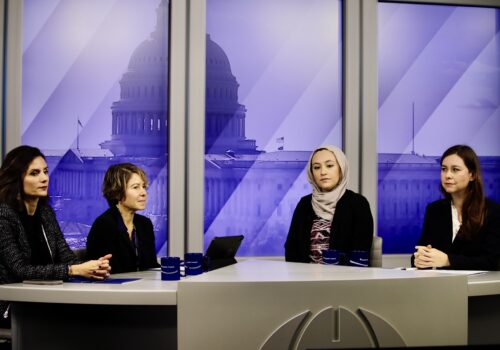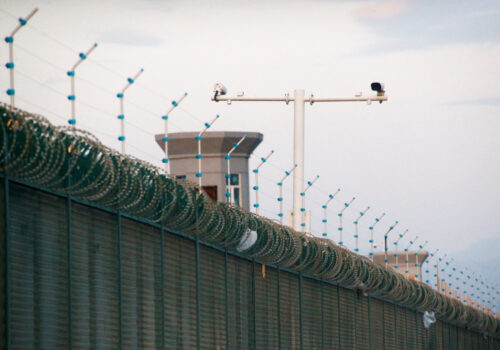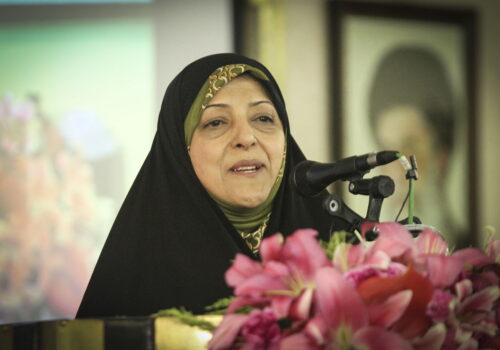New findings: Russian aerial attacks amount to extermination and persecution
On June 25, 2025, the Atlantic Council’s Eurasia Center and Strategic Litigation Project, together with the International Partnership for Human Rights (IPHR) and the International Human Rights Clinic at Harvard Law School (IHRC), hosted a hybrid panel discussion on new findings and policy implications surrounding Russian aerial attacks against Ukraine over the last three years. The event was moderated by Strategic Litigation Project Staff Lawyer Celeste Kmiotek.
In his introductory remarks, IPHR Project Director for Eastern Europe and the South Caucasus Simon Papuashvili discussed the situation on the ground in Ukraine, stating that “Putin is not interested in peace; he is committed to a long brutal war. The only way to stop him and to safeguard Ukraine and Western allied security is by sustaining and strengthening military, financial, and political support for Ukraine.”
Russian aerial attacks as crimes against humanity and war crimes
In the first portion of the event, IPHR and IHRC panelists discussed the findings of their newly published report, “Airstrikes and Atrocities: A Legal Assessment of Russia’s Aerial Campaign in Ukraine,” in which they demonstrate that these aerial attacks amount to several crimes against humanity, including those of murder, extermination, persecution, and other inhumane acts as well as war crimes, including those of intentionally directing attacks against civilians, civilian objects, and other specially protected objects, and of disproportionate attacks and starvation. To introduce this portion of the event, Team Lead of Ukraine Legal Team for IPHR, Anastasiya Donets discussed her team’s work in Ukraine and the specific need to work on investigating aerial attacks. “Russian attacks have escalated dramatically since early 2025, which coincided with the beginnings of the peace talks with Russia, and we do not think it’s a coincidence,” said Donets.
The report aimed to advance justice for war crimes and crimes against humanity in Ukraine, to complement Donets’ fact-finding work at IPHR with IHRC’s legal analysis, and to “develop the jurisprudence around war crimes and crimes against humanity,” as IHRC Director and Clinical Professor of Law at Harvard Law School Susan Farbstein explained. In doing so, the report showcases that international law still matters and that it is possible to prosecute these kinds of cases. Oceania Eshraghi, a member of the clinical team that authored the report, discussed the primary findings of the report as well as the process of using IPHR’s evidence to build legal arguments, saying that the team wanted to focus on “highlighting the crimes against humanity of extermination and persecution.”
During the harsh winter months, Russia’s actions have led to prolonged power outages lasting for weeks, creating life-threatening conditions for civilians. These blackouts not only hinder access to essential information but also disable air raid sirens, leaving Ukrainians unaware of imminent attacks and without guidance on evacuation routes. These conditions “represent a deliberate effort by Russia to create unlivable conditions for Ukraine’s civilian population, consistent with the crime [against humanity of] extermination” Eshraghi said. She continued: the report establishes the crime against humanity of persecution by demonstrating how “Russia’s actions have resulted in the clear deprivation of Ukrainians fundamental rights, most notably the right to life, the right to education, and the right to cultural participation.” This deprivation “has been carried out with the requisite discriminatory intent, specifically targeting individuals because of their Ukrainian identity.”
Subscribe
Sign up for the latest updates from the Strategic Litigation Project
Eshraghi continued by outlining two overarching patterns in the Russian attacks: “first, attacks on critical energy infrastructure including electric grids and power grids. And second, attacks on civilians and civilian objects with the use of precision guided weapons.” She concluded the objective of the attacks was to “disrupt and destabilize the entire energy system in Ukraine on such a scale that it inflicts significant harm on the civilian population.” Furthermore, Russia has destroyed or damaged over “seven hundred medical facilities and over 1,500 schools or colleges, often in areas where there’s not [an] identifiable military target nearby.” This illustrates the Russian military’s intention to “terrorize and demoralize the Ukrainian population to ultimately encourage their surrender or their [decision to] flee.”
Donets implored the US government to implement a strong sanctions bill against Russia that is currently under consideration in Congress and has bipartisan support. She emphasized that “a bill that mandates, rather than leaves room for, sweeping sanctions for Russia, will demonstrate that atrocities described in today’s report come at a high cost and so does Russia’s mockery of US-led peace talks.”
The policy implications of Russia’s total war
The second half of the event consisted of a panel discussion on the policy implications of Russia’s total war, featuring Eurasia Center Distinguished Fellow Ambassador William B. Taylor and Security and Defense Researcher at RAND Corporation Michael Cecire. When asked about the path forward, Ambassador Taylor emphasized the real-world implications for Putin of international accountability: “He is an indicted war criminal by the International Criminal Court . . . he has not been able to travel to some places. He’s turned down, had to skip meetings because of it.” Additionally, he stated that “[Ukraine’s] defense industrial base which gives them agency has been dramatically expanded, not just drones, but [also] on the artillery [and] vehicles. This is a really important point that Ukrainians [can] say no. The Ukrainians have agency. Someone mentioned the minerals deal… that resulted in actually a pretty good agreement. The Ukrainians can say no; they now have the ability to prosecute.”
Next, Cecire offered questions to consider in policymaking: “How does our policy allow or at least not appreciably respond to these destructive measures? What are the downstream effects on our credibility? What are the downstream effects on the United States’ national security interests? And frankly, our moral credibility and standing?”
Donets added: “It’s really important to not only focus on the horrific things that Russia’s invasion brought into Ukraine and into the world . . . [but to also] focus on Ukrainian resilience. Focus on the future and the opportunities that this horrible war created. One of these opportunities is making international law more effective for who it was created for: civilians.”
The event concluded with a moderated question and answer session in which audience members posed questions about political messaging, the criteria for selecting case studies, and accountability measures within different jurisdictions, both domestically in Ukraine and through the International Criminal Court. Farbstein highlighted that the immediate focus is on demonstrating that accountability is attainable, which can in turn motivate broader action and engagement from the international community. This approach aims to show that justice is possible, encouraging others to meaningfully advocate for accountability on behalf of victims of crimes against humanity and war crimes.
Fatima Khan is a summer intern with the Atlantic Council’s Middle East programs.
Winnie Zheng is a summer intern with the Atlantic Council’s Middle East programs.
Further reading
Tue, Mar 19, 2024
Justice and accountability in the MENA region: The importance of women’s stories
Event Recap By
On Wednesday, February 14, the Atlantic Council’s Strategic Litigation Project hosted a hybrid panel event about the crucial role women and their testimonies play in pursuit of justice and accountability in the Middle East and North Africa (MENA).
Tue, Nov 26, 2024
China’s atrocity crimes in Xinjiang are entering an even darker phase. The UN must act.
New Atlanticist By Rayhan Asat
The suffering of the Uyghur people continues in Xinjiang, and the United Nations has a responsibility to act on its recommendations.
Thu, Oct 24, 2024
Iran targeted human rights sanctions series: Can children of Iranian officials be designated?
IranSource By Holly Dagres, Celeste Kmiotek, Lisandra Novo
Children of Iranian officials might be impacted by targeted human rights designations, but only through strict sanctions enforcement and investigation and only where there is political will.


